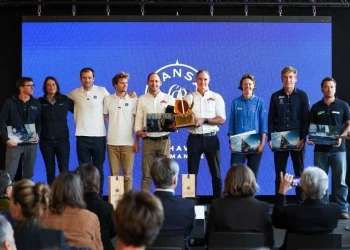
All boats setting sail on Sunday
Transat Jacques Vabre: All boats setting sail on Sunday
For Class40, the race will be organised in two legs. At this morning's race briefing, Francis Le Goff, the Race Director explained what was planned for the start. It was confirmed that the 95 crews competing in the Transat Jacques Vabre Normandie Le Havre will all be setting off on Sunday. Christian Dumard, the race's weather expert talked about what lies ahead dir the first few days of the race. Taking into account the violence of the low-pressure system due to arrive in the Bay of Biscay on Tuesday and Wednesday, it has been decided that the Class40 boats will race to Fort-de-France in two legs with a stopover in Lorient.
The amphitheatre in the docks was lit up this morning, but the atmosphere was rather dark reminding everyone of previous rough races. Everyone listened intently to the detailed briefing as the 2023 race will be another of those rough ones, if we are to believe the weather charts drawn up by Christian Dumard. There is still some divergence about the strength of the gusts and the timing concerning when the fronts will pass over, but the general synopsis is that for the start on Sunday, conditions will be lively, but can be dealt with. The forecast is for a 20-25 knot SW'ly wind with conditions remaining stable during the first night and during Monday for the first part of this Transat Jacques Vabre Normandie Le Havre. The seas will be heavy with 4m high waves around Ushant for the ULTIM boats on Sunday night, but should ease off by the time the first Ocean Fifty and IMOCAs get there on Monday morning.
The arrival of a second very deep low-pressure system sweeping across the Atlantic is forecast for Tuesday 31st October with a pressure at its centre of less than 980 hPa. While waves should remain below 4m on Monday, hellish conditions are forecast at the latitude of Cape Finisterre for 2nd November "with 8m high waves and winds in excess of 40 knots, and around the NW tip of Spain winds tend to be even faster, " explained Christian Dumard.
For the quicker classes, they will have to keep the pace up to avoid the situation, but that should be possible. "The shortening of the coastal run announced yesterday was designed with that in mind," explained Francis Le Goff, "but each competitor will have to deal with it based on their speed and the timing of the arrival of the low. There are plenty of ports along the way, if they want to wait.'
A stopover in Lorient La Base for the Class40 boats
On the other hand, the Class40 boats will find themselves blocked with no way out. When the Race Director announced in the second part of the briefing for the 44 crews in the amphitheatre in the docks that they would be racing the Transat Jacques Vabre Normandie Le Havre in two legs, everyone applauded, as they had anticipated this decision. "A finish line will be put in place off Lorient and a second start will be organised when weather permits to allow them to sail safely to Fort-de-France. The second start will for the whole of the Class40 fleet and the rankings will be established in Martinique at the finish by combining the two times for the legs."
The goal was to ensure the crews are safe and that the race remains fair. The situation demanded a quick reaction from the organisers of the Coffee Route, as Gildas Gautier, joint General Director of the race explained, "We ran through this with the SELLOR (Lorient harbour authorities - editor), this morning and they immediately replied that they would do everything they could to welcome the 44 Class40 boats safely. This agreement was necessary before confirming the new race course for the Class 40 boats. All of the competitors will have a place in Lorient La Base, so we would like to thank the authorities in the port of Lorient for their support."
Quotes from the sailors after the briefing
Erwan Le Roux (Koesio), Ocean Fifty: "When setting off in such conditions, you can never feel that happy and there is a certain amount of apprehension. We're off to war with no warm up and getting straight into it. We are going to have to deal with our energy, tiredness and seasickness. The first problem will be avoiding damage to the boat on the way out of the harbour. Then, it will be down to us to sail in a way that ensures the boat remains whole, so that we can go all the way. The main feature of the first night will be the low-pressure system and the NW'ly winds which will arrive. We will have a change of tack to do around the Scilly Isles, so quite some way west. What is going to be crucial is the arrival of the second low, which may require us to dive south before changing tack in heavy seas and strong winds off Cape Finisterre. I can't wait for Wednesday when we can start to dive down."
Ambrogio Beccaria (Alla Grande Pirelli), Class40: "I don't feel any relief or frustration. We were ready to go, but this was a wise decision for the fleet, as it avoids exposing the slower boats in Class40 to the danger. It's a wise choice to ensure that the race can go on. We dive straight in at the deep end, so it's going to be tough."
Nicolas Andrieu (Alla Grande Pirelli), Class40: "That changes quite a lot of things, starting with the course, which will involve sailing closer to the coast and that will keep us busy. We are going to have to give it our all for 36 hours."
Vincent Riou (Crosscall), Class40: "I have raced solo and double-handed in the Transat Jacques Vabre and now it's going to be in two legs. Let's go for it. What is clear is that if we had kept to the initial course, it would not have worked out. This unusual decision is very acceptable. The important thing is we will be racing and I hope there will be 44 boats at the start of the second leg and that we all enjoy it. We're now waiting for the rules. As for us, we had determined our choice of sails, as it was a typical course. Will we be able to change them now or be at a handicap? We don't know yet. We're setting off on a sprint in fairly strong winds with various points of sail and lots of manoeuvres. Psychologically, we had imagined how things were going to be, but now we're going to have to think about it all differently and get back in front of the computer."
Clément Giraud (Coup de Pouce - Giffard Manutention), IMOCA: "It shouldn't be too tricky getting out of the English Channel. But the second low is different kettle of fish, as it is down to the timing. We are going to have to take a decision – to stop or not – once we have got away from the tip of Brittany. That will depend how far we have sailed and what is happening. As a sailor, we will go for it, if we can. But if things get worse, even slightly so, there is the risk of 60-knot gusts and 6-8m or even 10m high waves. The charts today are rather scary. I am under the responsibility of my co-skipper and we'll come to a decision together to take as few risks as possible."
Anthony Marchand (Actual Ultim 3), ULTIM: "It's nice to have a fast boat in these conditions. That is often the case, as it gives you a greater choice in terms of the weather. Having said that, conditions are going to be pretty nasty for us. But if we don't have any technical problems, it is highly likely that we can avoid the worst of the low, as we'll already be down at the latitude of Gibraltar when it arrives. We'll be approaching the ridge of high pressure and in the sunshine patching up our wounds and drying our clothes. A different race can then begin."






